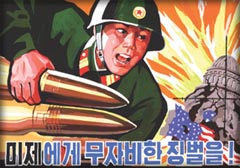 It has not escaped me that North Korea is coming to the table, offering to give up its nuclear program. It’s not a perfect deal, but it is a step in the right direction.
It has not escaped me that North Korea is coming to the table, offering to give up its nuclear program. It’s not a perfect deal, but it is a step in the right direction.
Of course, it was not the threat of war that brought them there — we have no troops (they are in Iraq and Louisiana). It was the use of John Kerry-like tactics of diplomacy, and having some flexibility. Apparently, all the Bush successes, however modest, are based on liberal ideas.
Kevin Drum picks up my thoughts:
Yesterday I was wondering how the conservosphere would react to the recently announced progress in talks with North Korea. After all, the Bush administration pretty much agreed to the same thing Clinton agreed to in 1994, and that’s bad. On the other hand, it’s Bush, so that must be good. What to think?
Apparently it really is confusing: Instapundit and Power Line and Michelle Malkin and Hugh Hewitt are mostly silent. That means we have to turn to Ed Morrissey to get our daily dose of hero worship. Here he takes the New York Times to task for not understanding the steely tactics that produced Monday’s agreement:
If the New York Times wants to pretend it doesn’t understand the purpose of our actions in Afghanistan and Iraq, the Kim regime does not have that luxury. They understood that the Bush administration would not send Rice to Pyongyang to dance cheek to cheek with Kim, a la Madeline Albright, but to deliver an ultimatum that would result in his destruction. After testing the Bush administration several times and finding it unwilling to waver, even after a number of Bush’s political opponents (such as John Kerry) fell for his tricks, Kim knows that Bush has him diplomatically isolated and left with no choice but compliance or war.
Italics mine. And now for the reality check. Here’s what the news columns of the New York Times say about what really happened:
Several [Bush administration] officials, who would not allow their names to be used because they did not want to publicly discuss Mr. Bush’s political challenges, noted that Mr. Bush is tied down in Iraq, consumed by Hurricane Katrina, and headed into another standoff over Iran’s nuclear program. The agreement, they said, provides him with a way to forestall, at least for now, a confrontation with another member of what he once famously termed "the axis of evil."
…The debate over signing the agreement reflected the fact that the North Koreans drove a tough bargain. The agreement has the potential to generate good will for North Korea, increase the aid it receives and possibly reduce its incentive to dismantle its nuclear programs anytime soon.
….As this unfolded over the weekend, the Chinese increased pressure on the United States to sign — or take responsibility for a breakdown in the talks.
"At one point they told us that we were totally isolated on this and that they would go to the press," and explain that the United States sank the accord, the senior administration official said.
The North Koreans "drove a tough bargain." The Chinese told us to sign the agreement or "they would go to the press." Bush wasn’t happy, but since he was bogged down with other problems he grabbed at the chance to "forestall, at least for now, a confrontation."
Yep, that’s some steely negotiating. After all, the North Koreans got nothing out of this deal except for every single thing they’ve ever asked for.
Overall, I’m with Winston Churchill: "To jaw-jaw is always better than to war-war." Bush made the right decision to show some flexibility here, regardless of whether this agreement ultimately goes anywhere. But make no mistake: there was no ultimatum on our side. Quite the contrary.

